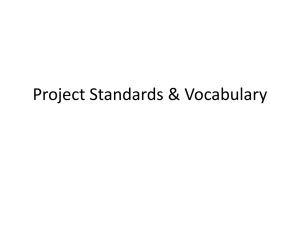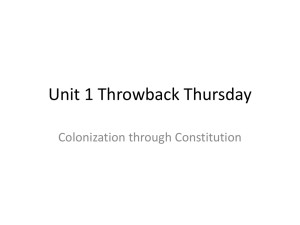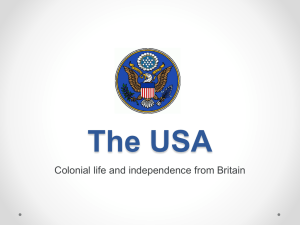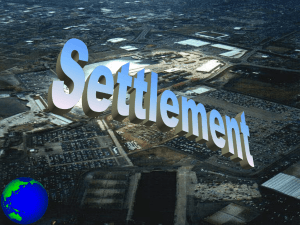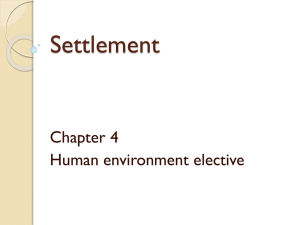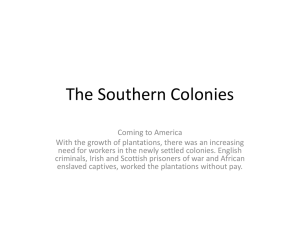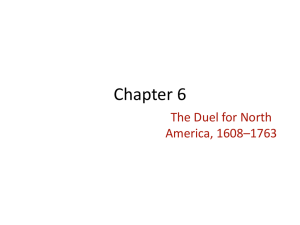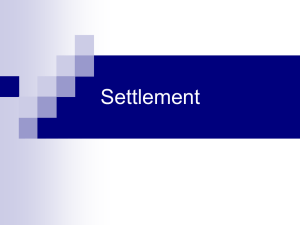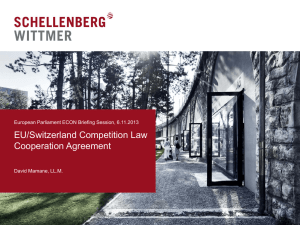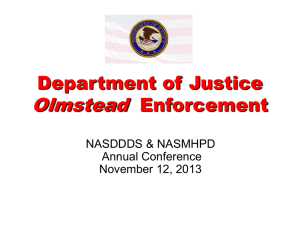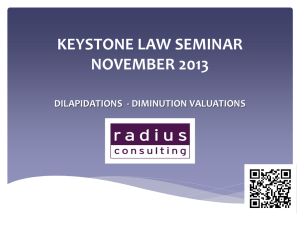Standard 1 - bervelynbenson
advertisement
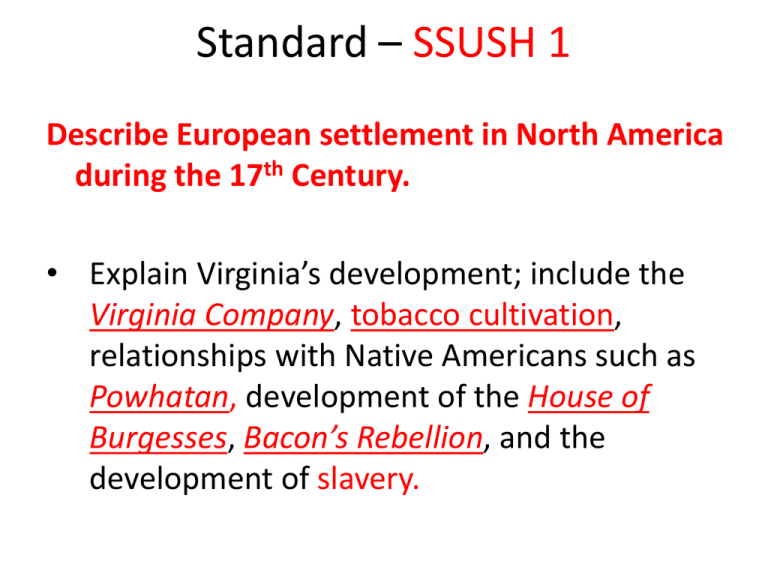
Standard – SSUSH 1
Describe European settlement in North America
during the 17th Century.
• Explain Virginia’s development; include the
Virginia Company, tobacco cultivation,
relationships with Native Americans such as
Powhatan, development of the House of
Burgesses, Bacon’s Rebellion, and the
development of slavery.
The Development of Virginia
Virginia Company
Seal of the Virginia Company
•An English business that financed the ships full of single men looking to
make money; founded Jamestown and founded the colony of Virginia
•Discovery of a new type of Tobacco [John Rolfe] saved Jamestown and
Virginia and made profitable and popular – more English settlers were
attracted to colony – population boom
Powhatan
Chief Powhatan/Father of Pocahantas
His friendship with John Smith helped the Jamestown settlement
survive. At the death of Powhatan, conflicts between the colonists
and the Powhatan Confederacy increased as more English settlers
arrived.
House of Burgesses
•First English Legislative Assembly in North
America, in Virginia
• Created a precedent of self government in the
colonies
Bacon’s Rebellion
Nathaniel Bacon
•Bacon led a group of backcountry farmers who wanted to
attack and take over Indian lands as well as take over Virginia
•His rebellion led to more land to farm, more slaves for those
lands, and democratic changes in Virginia.
Standard – SSUSH 1
Describe European settlement in North America during the 17th
Century.
•
•
•
•
Describe the settlement of New England; include religious reasons,
relations with Native Americans [e.g., King Phillip’s War], the
establishment of town meetings and development of a legislature,
religious tensions that led to the founding of Rhode Island, the halfway covenant, Salem Witch Trials, and the loss of the Massachusetts
charter and the transition to a royal colony.
Explain the development of the mid-Atlantic colonies; include the
Dutch settlement of New Amsterdam {New York} and the
subsequent English takeover, and the settlement of Pennsylvania.
Explain the reasons for French settlement of Quebec.
Analyze the impact of location and place on colonial settlement,
transportation, and economic development; include southern,
middle, and New England colonies.
New England
Religion
Colonists/church
members met
together to
solve problems;
meetings
developed into
legislatures……..
precedent of
self-government
Puritans came to escape
persecution in England and
for religious freedom;
whole families of various
churches came to New
England and established
small farms around towns
New
England
Colonies
Town
Meetings
Native
Americans
As more
settlers came,
conflicts
increased over
land and
cultural
differences
resulting in
violence
Massachusetts
•Founded in the 1620s by Puritans seeking religious freedom.
•Religious intolerance in Massachusetts led to the founding of other New England
colonies – Rhode Island
•In 1684, loss of charter due to religious and independent attitude toward England’s
Laws [Navigation Acts] – illegal smuggling and trade common in New England
New England
Religious intolerance in Massachusetts led to
founding of new colonies in New England
Anne Hutchinson was
banished from
Massachusetts for
preaching differently than
the colony’s religious
leaders.
She founded her own
settlement in
RHODE ISLAND.
Roger Williams was also
banished for promoting
unpopular religious views.
He founded his own
settlement in RHODE
ISLAND.
Rhode Island
Founded by Roger Williams because of the
religious intolerance in Massachusetts
Salem Witch Trials
•Religious fear and hysteria led to the deaths of many in Salem,
Massachusetts who were falsely accused of being witches.
• Clear example of the religious intolerance in New England
Half Way Covenant
• The
HALFWAY COVENANT encourage people, specifically young
adults, to join the church by cutting the number of “rules” in half
• Response to declining church membership due to rise of First
Great Awakening revival movement
King Philip’s War
•War between New England colonists and Native
Americans.
•Led to the destruction and removal of most
Indian tribes in New England.
Standard – SSUSH 1
Describe European settlement in North America during
the 17th Century.
•
•
•
Explain the development of the mid-Atlantic colonies;
include the Dutch settlement of New Amsterdam {New
York} and the subsequent English takeover, and the
settlement of Pennsylvania.
Explain the reasons for French settlement of Quebec.
Analyze the impact of location and place on colonial
settlement, transportation, and economic
development; include southern, middle, and New
England colonies.
Mid-Atlantic Colonies
The Dutch
settle at
“New
Amsterdam”
The English
take over the
Dutch
settlement to
gain control of
Hudson River
trade
Pennsylvania is settled
by “Quakers”;
William Penn wants it
to be a “Holy
Experiment” with
complete religious
freedom
Mid Atlantic Colonies
•Known as the “Bread Basket” Colonies. – wheat main crop/export
•Prosperous and diverse populations.
•Contained biggest cities – Philadelphia/New York
Pennsylvania
•Founded by William Penn as a safe haven for Quakers.
•Good relations with Native Americans and religious tolerance.
•Prosperous colony, with Philadelphia becoming the biggest city.
•Benjamin Franklin most prominent colonist.
New Amsterdam
•New Amsterdam renamed New York when the English forcibly took
over and removed Dutch control.
•Dutch allowed a diverse and religious tolerant society to grow in New
Amsterdam. English continued those policies.
Standard – SSUSH 1
Describe European settlement in North America
during the 17th Century.
• Explain the reasons for French settlement of
Quebec.
• Analyze the impact of location and place on
colonial settlement, transportation, and
economic development; include southern,
middle, and New England colonies.
Quebec
•Capitol city of New France.
•Became a fur trading center.
•Still a French speaking province in Canada.
French/Quebec
FRENCH = FUR
• Fashion trend – using Beaver fur for hats encouraged building of more
French trading posts in Canada
Standard – SSUSH 1
Describe European settlement in North America
during the 17th Century.
• Analyze the impact of location and place on
colonial settlement, transportation, and
economic development; include southern,
middle, and New England colonies.
Location and Place - Geography
• New England
– Geographic features of land encouraged creation of
small family farms [No need for slaves]
– Establishment of churches and towns built around
church congregations
– Colonists had little to trade to “Mother”
country/England so precedent of illegal
trading/smuggling common in New England –
precedent of commerce and business
– Religious intolerance led to creation of other
colonies
– Religious sentiment led to view of slavery as evil
Location and Place - Geography
• Virginia and the South
– Geographic features of land encouraged creation
of large farms/plantations to cultivate cash crops/
tobacco
– Colonists main trading partner “Mother”
country/England so plantations located near rivers
to transport cash crops to England
– Religious hypocrisy led to view of slavery as good
for “savages”
– Economic greed led to view of slavery as
necessary
Location and Place - Geography
• Mid-Atlantic Colonies
– Geographic features of land encouraged creation
of wheat farms
– Colonists main trading partner other colonies and
then Mother England – need for infrastructure to
bring goods to eastern/southern colonies
– Proximity to Native Americans led to peaceful
coexistence between colonists and American
Indians
– Tolerance key characteristics in Philadelphia and
New York – led to diversity of cultures




